Evidence-Based Practice: Improving Musculoskeletal Physiotherapy
VerifiedAdded on 2023/06/13
|8
|2729
|246
Essay
AI Summary
This essay delves into the importance of evidence-based practice in musculoskeletal physiotherapy, emphasizing the integration of research evidence, clinical expertise, and patient values for optimal healthcare delivery. It highlights the significance of knowledge transfer between healthcare professionals and musculoskeletal physiotherapists to improve practices and patient outcomes. The essay identifies key steps in evidence-based practice, including clinical problem conversion, evidence accumulation, validity evaluation, clinical application, and effectiveness assessment. It also addresses barriers to effective physiotherapy, such as time constraints and lack of understanding, and underscores the role of facilitators in promoting learning and support. The essay concludes that a well-executed knowledge transfer plan, grounded in evidence, is crucial for enhancing patient care in musculoskeletal physiotherapy, promoting informed decision-making, and ensuring the utilization of appropriate procedures in healthcare settings.
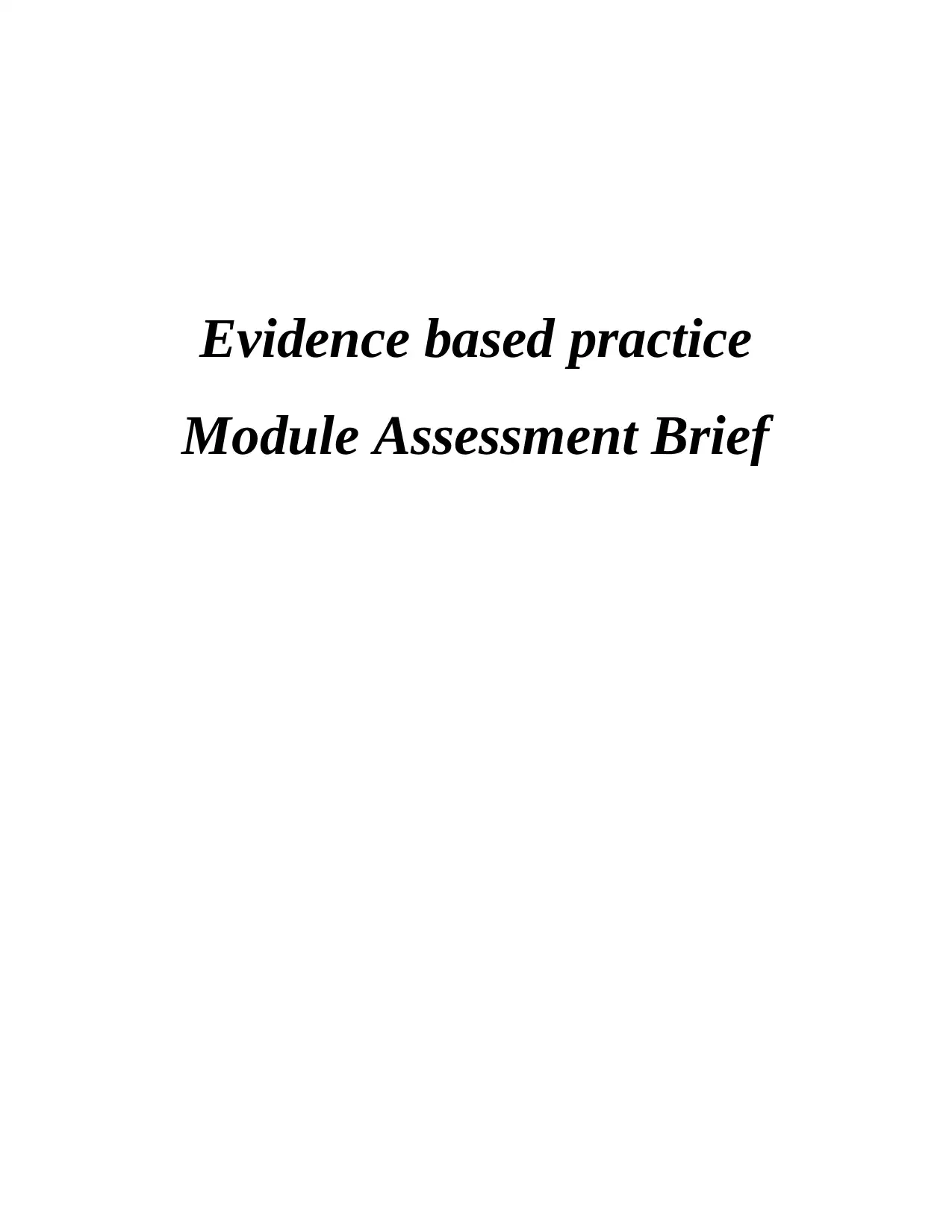
Evidence based practice
Module Assessment Brief
Module Assessment Brief
Paraphrase This Document
Need a fresh take? Get an instant paraphrase of this document with our AI Paraphraser
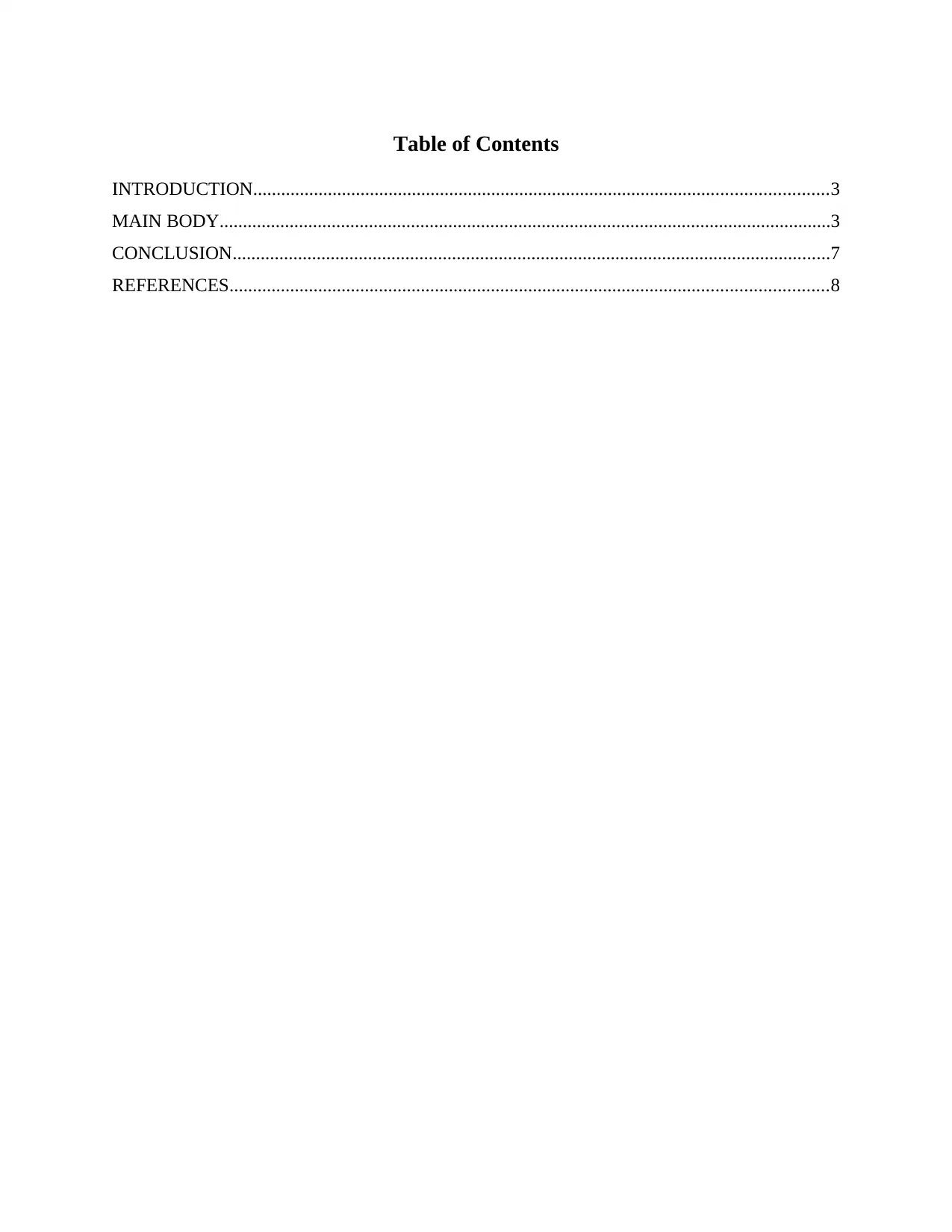
Table of Contents
INTRODUCTION...........................................................................................................................3
MAIN BODY...................................................................................................................................3
CONCLUSION................................................................................................................................7
REFERENCES................................................................................................................................8
INTRODUCTION...........................................................................................................................3
MAIN BODY...................................................................................................................................3
CONCLUSION................................................................................................................................7
REFERENCES................................................................................................................................8
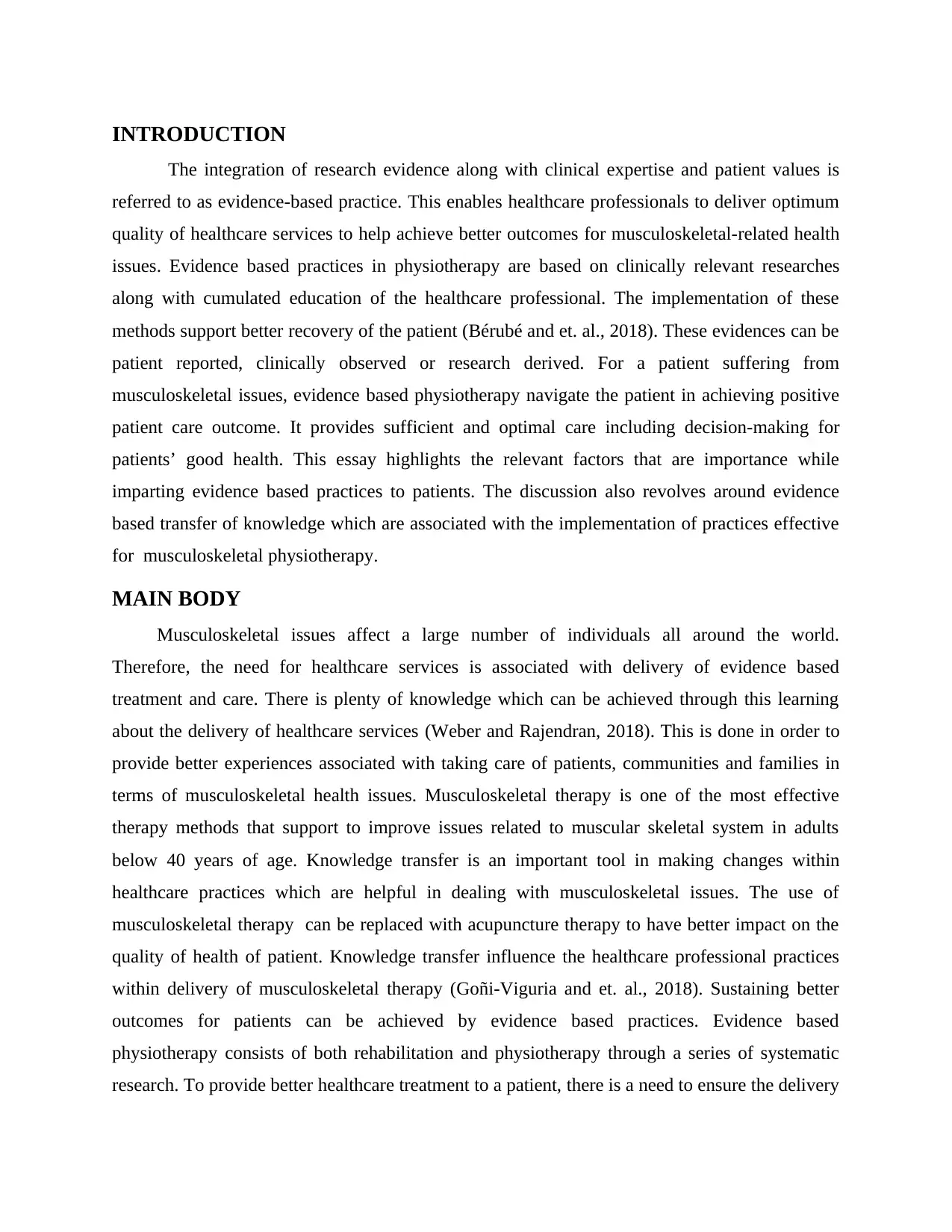
INTRODUCTION
The integration of research evidence along with clinical expertise and patient values is
referred to as evidence-based practice. This enables healthcare professionals to deliver optimum
quality of healthcare services to help achieve better outcomes for musculoskeletal-related health
issues. Evidence based practices in physiotherapy are based on clinically relevant researches
along with cumulated education of the healthcare professional. The implementation of these
methods support better recovery of the patient (Bérubé and et. al., 2018). These evidences can be
patient reported, clinically observed or research derived. For a patient suffering from
musculoskeletal issues, evidence based physiotherapy navigate the patient in achieving positive
patient care outcome. It provides sufficient and optimal care including decision-making for
patients’ good health. This essay highlights the relevant factors that are importance while
imparting evidence based practices to patients. The discussion also revolves around evidence
based transfer of knowledge which are associated with the implementation of practices effective
for musculoskeletal physiotherapy.
MAIN BODY
Musculoskeletal issues affect a large number of individuals all around the world.
Therefore, the need for healthcare services is associated with delivery of evidence based
treatment and care. There is plenty of knowledge which can be achieved through this learning
about the delivery of healthcare services (Weber and Rajendran, 2018). This is done in order to
provide better experiences associated with taking care of patients, communities and families in
terms of musculoskeletal health issues. Musculoskeletal therapy is one of the most effective
therapy methods that support to improve issues related to muscular skeletal system in adults
below 40 years of age. Knowledge transfer is an important tool in making changes within
healthcare practices which are helpful in dealing with musculoskeletal issues. The use of
musculoskeletal therapy can be replaced with acupuncture therapy to have better impact on the
quality of health of patient. Knowledge transfer influence the healthcare professional practices
within delivery of musculoskeletal therapy (Goñi-Viguria and et. al., 2018). Sustaining better
outcomes for patients can be achieved by evidence based practices. Evidence based
physiotherapy consists of both rehabilitation and physiotherapy through a series of systematic
research. To provide better healthcare treatment to a patient, there is a need to ensure the delivery
The integration of research evidence along with clinical expertise and patient values is
referred to as evidence-based practice. This enables healthcare professionals to deliver optimum
quality of healthcare services to help achieve better outcomes for musculoskeletal-related health
issues. Evidence based practices in physiotherapy are based on clinically relevant researches
along with cumulated education of the healthcare professional. The implementation of these
methods support better recovery of the patient (Bérubé and et. al., 2018). These evidences can be
patient reported, clinically observed or research derived. For a patient suffering from
musculoskeletal issues, evidence based physiotherapy navigate the patient in achieving positive
patient care outcome. It provides sufficient and optimal care including decision-making for
patients’ good health. This essay highlights the relevant factors that are importance while
imparting evidence based practices to patients. The discussion also revolves around evidence
based transfer of knowledge which are associated with the implementation of practices effective
for musculoskeletal physiotherapy.
MAIN BODY
Musculoskeletal issues affect a large number of individuals all around the world.
Therefore, the need for healthcare services is associated with delivery of evidence based
treatment and care. There is plenty of knowledge which can be achieved through this learning
about the delivery of healthcare services (Weber and Rajendran, 2018). This is done in order to
provide better experiences associated with taking care of patients, communities and families in
terms of musculoskeletal health issues. Musculoskeletal therapy is one of the most effective
therapy methods that support to improve issues related to muscular skeletal system in adults
below 40 years of age. Knowledge transfer is an important tool in making changes within
healthcare practices which are helpful in dealing with musculoskeletal issues. The use of
musculoskeletal therapy can be replaced with acupuncture therapy to have better impact on the
quality of health of patient. Knowledge transfer influence the healthcare professional practices
within delivery of musculoskeletal therapy (Goñi-Viguria and et. al., 2018). Sustaining better
outcomes for patients can be achieved by evidence based practices. Evidence based
physiotherapy consists of both rehabilitation and physiotherapy through a series of systematic
research. To provide better healthcare treatment to a patient, there is a need to ensure the delivery
⊘ This is a preview!⊘
Do you want full access?
Subscribe today to unlock all pages.

Trusted by 1+ million students worldwide
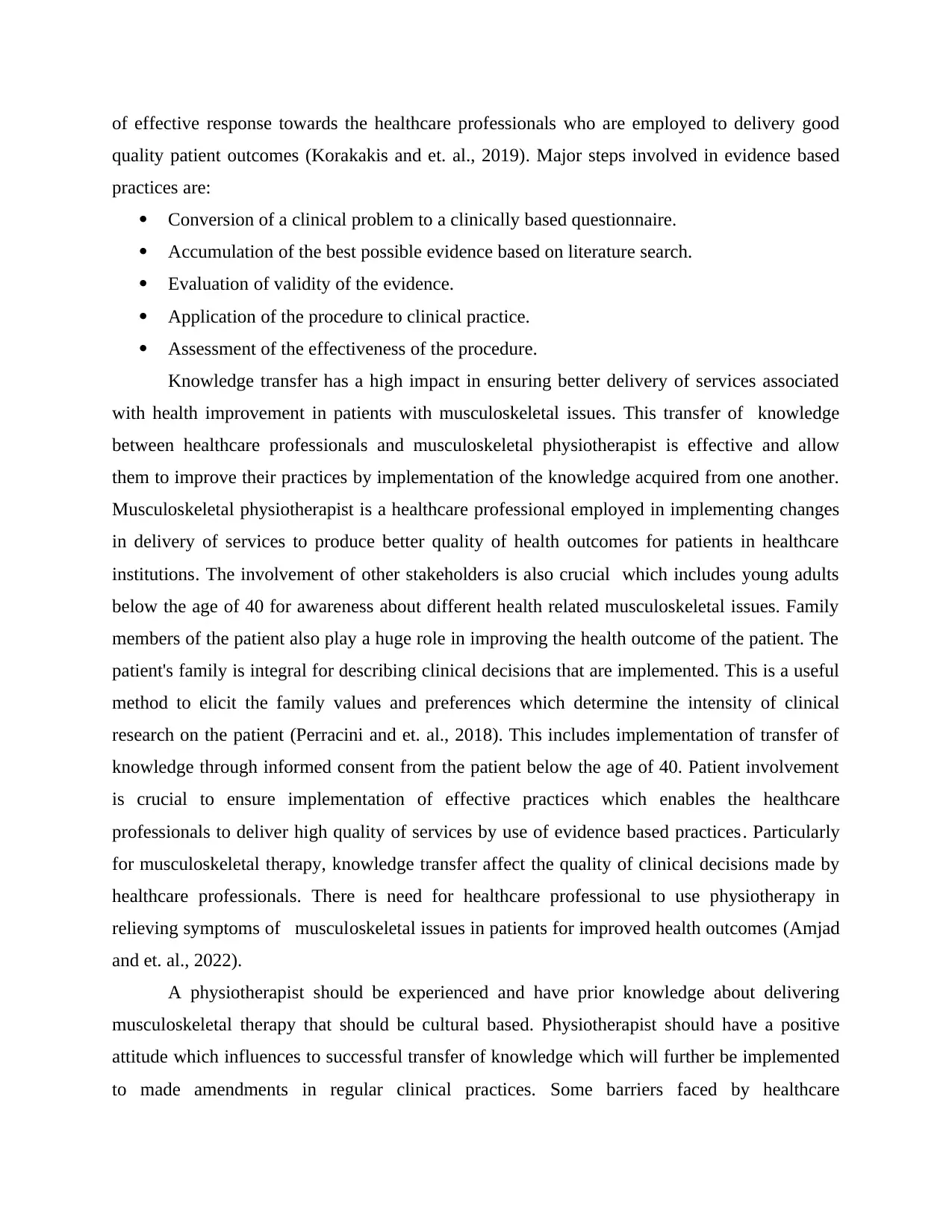
of effective response towards the healthcare professionals who are employed to delivery good
quality patient outcomes (Korakakis and et. al., 2019). Major steps involved in evidence based
practices are:
Conversion of a clinical problem to a clinically based questionnaire.
Accumulation of the best possible evidence based on literature search.
Evaluation of validity of the evidence.
Application of the procedure to clinical practice.
Assessment of the effectiveness of the procedure.
Knowledge transfer has a high impact in ensuring better delivery of services associated
with health improvement in patients with musculoskeletal issues. This transfer of knowledge
between healthcare professionals and musculoskeletal physiotherapist is effective and allow
them to improve their practices by implementation of the knowledge acquired from one another.
Musculoskeletal physiotherapist is a healthcare professional employed in implementing changes
in delivery of services to produce better quality of health outcomes for patients in healthcare
institutions. The involvement of other stakeholders is also crucial which includes young adults
below the age of 40 for awareness about different health related musculoskeletal issues. Family
members of the patient also play a huge role in improving the health outcome of the patient. The
patient's family is integral for describing clinical decisions that are implemented. This is a useful
method to elicit the family values and preferences which determine the intensity of clinical
research on the patient (Perracini and et. al., 2018). This includes implementation of transfer of
knowledge through informed consent from the patient below the age of 40. Patient involvement
is crucial to ensure implementation of effective practices which enables the healthcare
professionals to deliver high quality of services by use of evidence based practices. Particularly
for musculoskeletal therapy, knowledge transfer affect the quality of clinical decisions made by
healthcare professionals. There is need for healthcare professional to use physiotherapy in
relieving symptoms of musculoskeletal issues in patients for improved health outcomes (Amjad
and et. al., 2022).
A physiotherapist should be experienced and have prior knowledge about delivering
musculoskeletal therapy that should be cultural based. Physiotherapist should have a positive
attitude which influences to successful transfer of knowledge which will further be implemented
to made amendments in regular clinical practices. Some barriers faced by healthcare
quality patient outcomes (Korakakis and et. al., 2019). Major steps involved in evidence based
practices are:
Conversion of a clinical problem to a clinically based questionnaire.
Accumulation of the best possible evidence based on literature search.
Evaluation of validity of the evidence.
Application of the procedure to clinical practice.
Assessment of the effectiveness of the procedure.
Knowledge transfer has a high impact in ensuring better delivery of services associated
with health improvement in patients with musculoskeletal issues. This transfer of knowledge
between healthcare professionals and musculoskeletal physiotherapist is effective and allow
them to improve their practices by implementation of the knowledge acquired from one another.
Musculoskeletal physiotherapist is a healthcare professional employed in implementing changes
in delivery of services to produce better quality of health outcomes for patients in healthcare
institutions. The involvement of other stakeholders is also crucial which includes young adults
below the age of 40 for awareness about different health related musculoskeletal issues. Family
members of the patient also play a huge role in improving the health outcome of the patient. The
patient's family is integral for describing clinical decisions that are implemented. This is a useful
method to elicit the family values and preferences which determine the intensity of clinical
research on the patient (Perracini and et. al., 2018). This includes implementation of transfer of
knowledge through informed consent from the patient below the age of 40. Patient involvement
is crucial to ensure implementation of effective practices which enables the healthcare
professionals to deliver high quality of services by use of evidence based practices. Particularly
for musculoskeletal therapy, knowledge transfer affect the quality of clinical decisions made by
healthcare professionals. There is need for healthcare professional to use physiotherapy in
relieving symptoms of musculoskeletal issues in patients for improved health outcomes (Amjad
and et. al., 2022).
A physiotherapist should be experienced and have prior knowledge about delivering
musculoskeletal therapy that should be cultural based. Physiotherapist should have a positive
attitude which influences to successful transfer of knowledge which will further be implemented
to made amendments in regular clinical practices. Some barriers faced by healthcare
Paraphrase This Document
Need a fresh take? Get an instant paraphrase of this document with our AI Paraphraser
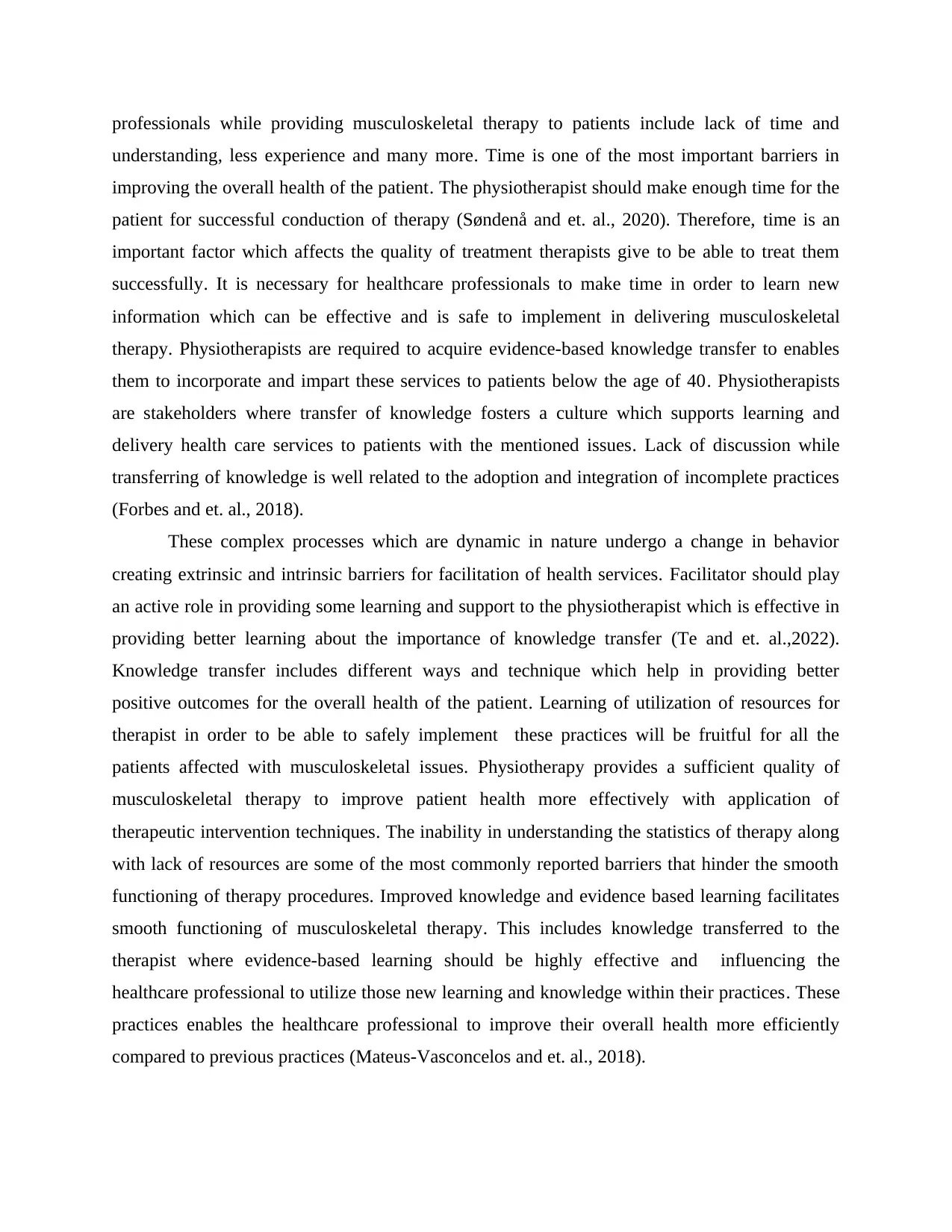
professionals while providing musculoskeletal therapy to patients include lack of time and
understanding, less experience and many more. Time is one of the most important barriers in
improving the overall health of the patient. The physiotherapist should make enough time for the
patient for successful conduction of therapy (Søndenå and et. al., 2020). Therefore, time is an
important factor which affects the quality of treatment therapists give to be able to treat them
successfully. It is necessary for healthcare professionals to make time in order to learn new
information which can be effective and is safe to implement in delivering musculoskeletal
therapy. Physiotherapists are required to acquire evidence-based knowledge transfer to enables
them to incorporate and impart these services to patients below the age of 40. Physiotherapists
are stakeholders where transfer of knowledge fosters a culture which supports learning and
delivery health care services to patients with the mentioned issues. Lack of discussion while
transferring of knowledge is well related to the adoption and integration of incomplete practices
(Forbes and et. al., 2018).
These complex processes which are dynamic in nature undergo a change in behavior
creating extrinsic and intrinsic barriers for facilitation of health services. Facilitator should play
an active role in providing some learning and support to the physiotherapist which is effective in
providing better learning about the importance of knowledge transfer (Te and et. al.,2022).
Knowledge transfer includes different ways and technique which help in providing better
positive outcomes for the overall health of the patient. Learning of utilization of resources for
therapist in order to be able to safely implement these practices will be fruitful for all the
patients affected with musculoskeletal issues. Physiotherapy provides a sufficient quality of
musculoskeletal therapy to improve patient health more effectively with application of
therapeutic intervention techniques. The inability in understanding the statistics of therapy along
with lack of resources are some of the most commonly reported barriers that hinder the smooth
functioning of therapy procedures. Improved knowledge and evidence based learning facilitates
smooth functioning of musculoskeletal therapy. This includes knowledge transferred to the
therapist where evidence-based learning should be highly effective and influencing the
healthcare professional to utilize those new learning and knowledge within their practices. These
practices enables the healthcare professional to improve their overall health more efficiently
compared to previous practices (Mateus-Vasconcelos and et. al., 2018).
understanding, less experience and many more. Time is one of the most important barriers in
improving the overall health of the patient. The physiotherapist should make enough time for the
patient for successful conduction of therapy (Søndenå and et. al., 2020). Therefore, time is an
important factor which affects the quality of treatment therapists give to be able to treat them
successfully. It is necessary for healthcare professionals to make time in order to learn new
information which can be effective and is safe to implement in delivering musculoskeletal
therapy. Physiotherapists are required to acquire evidence-based knowledge transfer to enables
them to incorporate and impart these services to patients below the age of 40. Physiotherapists
are stakeholders where transfer of knowledge fosters a culture which supports learning and
delivery health care services to patients with the mentioned issues. Lack of discussion while
transferring of knowledge is well related to the adoption and integration of incomplete practices
(Forbes and et. al., 2018).
These complex processes which are dynamic in nature undergo a change in behavior
creating extrinsic and intrinsic barriers for facilitation of health services. Facilitator should play
an active role in providing some learning and support to the physiotherapist which is effective in
providing better learning about the importance of knowledge transfer (Te and et. al.,2022).
Knowledge transfer includes different ways and technique which help in providing better
positive outcomes for the overall health of the patient. Learning of utilization of resources for
therapist in order to be able to safely implement these practices will be fruitful for all the
patients affected with musculoskeletal issues. Physiotherapy provides a sufficient quality of
musculoskeletal therapy to improve patient health more effectively with application of
therapeutic intervention techniques. The inability in understanding the statistics of therapy along
with lack of resources are some of the most commonly reported barriers that hinder the smooth
functioning of therapy procedures. Improved knowledge and evidence based learning facilitates
smooth functioning of musculoskeletal therapy. This includes knowledge transferred to the
therapist where evidence-based learning should be highly effective and influencing the
healthcare professional to utilize those new learning and knowledge within their practices. These
practices enables the healthcare professional to improve their overall health more efficiently
compared to previous practices (Mateus-Vasconcelos and et. al., 2018).
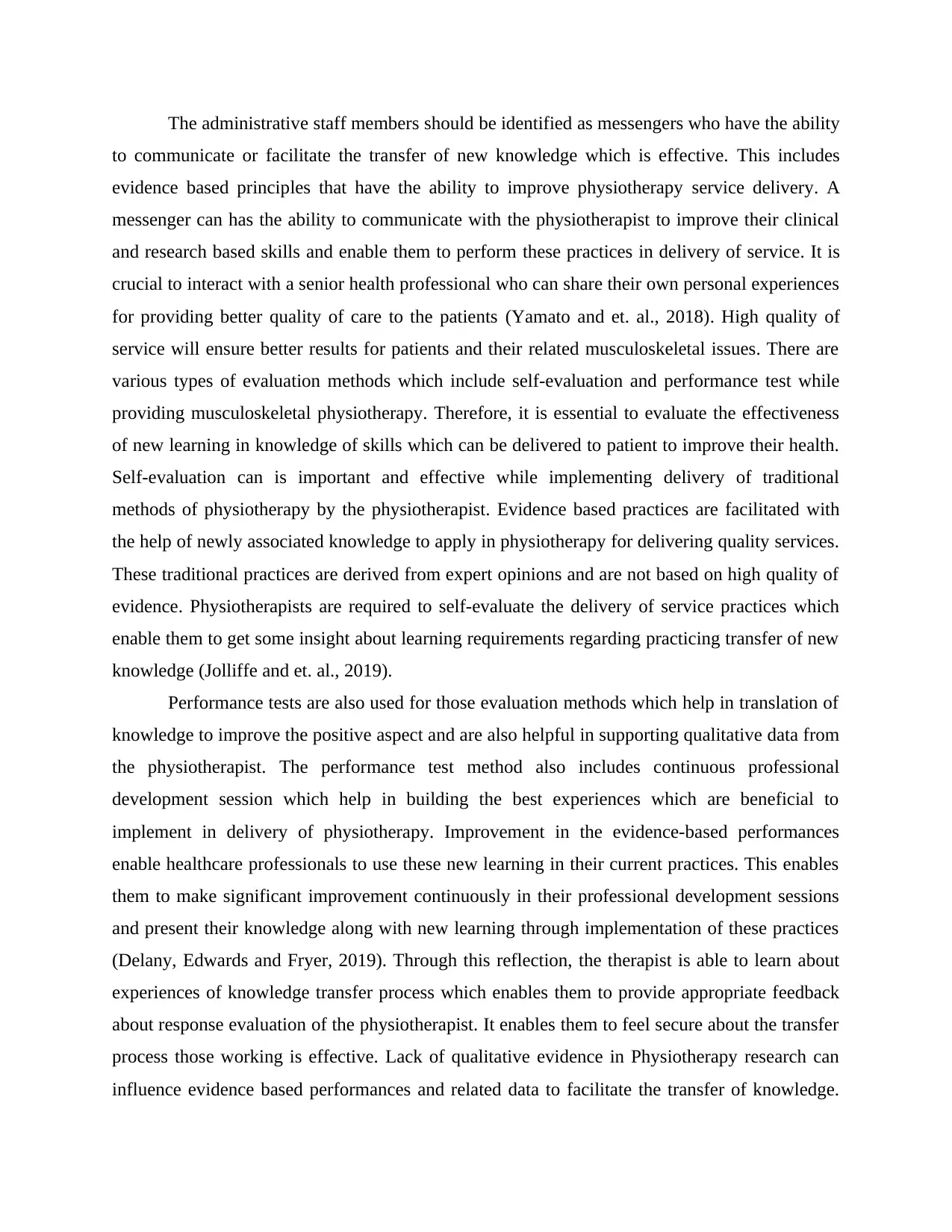
The administrative staff members should be identified as messengers who have the ability
to communicate or facilitate the transfer of new knowledge which is effective. This includes
evidence based principles that have the ability to improve physiotherapy service delivery. A
messenger can has the ability to communicate with the physiotherapist to improve their clinical
and research based skills and enable them to perform these practices in delivery of service. It is
crucial to interact with a senior health professional who can share their own personal experiences
for providing better quality of care to the patients (Yamato and et. al., 2018). High quality of
service will ensure better results for patients and their related musculoskeletal issues. There are
various types of evaluation methods which include self-evaluation and performance test while
providing musculoskeletal physiotherapy. Therefore, it is essential to evaluate the effectiveness
of new learning in knowledge of skills which can be delivered to patient to improve their health.
Self-evaluation can is important and effective while implementing delivery of traditional
methods of physiotherapy by the physiotherapist. Evidence based practices are facilitated with
the help of newly associated knowledge to apply in physiotherapy for delivering quality services.
These traditional practices are derived from expert opinions and are not based on high quality of
evidence. Physiotherapists are required to self-evaluate the delivery of service practices which
enable them to get some insight about learning requirements regarding practicing transfer of new
knowledge (Jolliffe and et. al., 2019).
Performance tests are also used for those evaluation methods which help in translation of
knowledge to improve the positive aspect and are also helpful in supporting qualitative data from
the physiotherapist. The performance test method also includes continuous professional
development session which help in building the best experiences which are beneficial to
implement in delivery of physiotherapy. Improvement in the evidence-based performances
enable healthcare professionals to use these new learning in their current practices. This enables
them to make significant improvement continuously in their professional development sessions
and present their knowledge along with new learning through implementation of these practices
(Delany, Edwards and Fryer, 2019). Through this reflection, the therapist is able to learn about
experiences of knowledge transfer process which enables them to provide appropriate feedback
about response evaluation of the physiotherapist. It enables them to feel secure about the transfer
process those working is effective. Lack of qualitative evidence in Physiotherapy research can
influence evidence based performances and related data to facilitate the transfer of knowledge.
to communicate or facilitate the transfer of new knowledge which is effective. This includes
evidence based principles that have the ability to improve physiotherapy service delivery. A
messenger can has the ability to communicate with the physiotherapist to improve their clinical
and research based skills and enable them to perform these practices in delivery of service. It is
crucial to interact with a senior health professional who can share their own personal experiences
for providing better quality of care to the patients (Yamato and et. al., 2018). High quality of
service will ensure better results for patients and their related musculoskeletal issues. There are
various types of evaluation methods which include self-evaluation and performance test while
providing musculoskeletal physiotherapy. Therefore, it is essential to evaluate the effectiveness
of new learning in knowledge of skills which can be delivered to patient to improve their health.
Self-evaluation can is important and effective while implementing delivery of traditional
methods of physiotherapy by the physiotherapist. Evidence based practices are facilitated with
the help of newly associated knowledge to apply in physiotherapy for delivering quality services.
These traditional practices are derived from expert opinions and are not based on high quality of
evidence. Physiotherapists are required to self-evaluate the delivery of service practices which
enable them to get some insight about learning requirements regarding practicing transfer of new
knowledge (Jolliffe and et. al., 2019).
Performance tests are also used for those evaluation methods which help in translation of
knowledge to improve the positive aspect and are also helpful in supporting qualitative data from
the physiotherapist. The performance test method also includes continuous professional
development session which help in building the best experiences which are beneficial to
implement in delivery of physiotherapy. Improvement in the evidence-based performances
enable healthcare professionals to use these new learning in their current practices. This enables
them to make significant improvement continuously in their professional development sessions
and present their knowledge along with new learning through implementation of these practices
(Delany, Edwards and Fryer, 2019). Through this reflection, the therapist is able to learn about
experiences of knowledge transfer process which enables them to provide appropriate feedback
about response evaluation of the physiotherapist. It enables them to feel secure about the transfer
process those working is effective. Lack of qualitative evidence in Physiotherapy research can
influence evidence based performances and related data to facilitate the transfer of knowledge.
⊘ This is a preview!⊘
Do you want full access?
Subscribe today to unlock all pages.

Trusted by 1+ million students worldwide
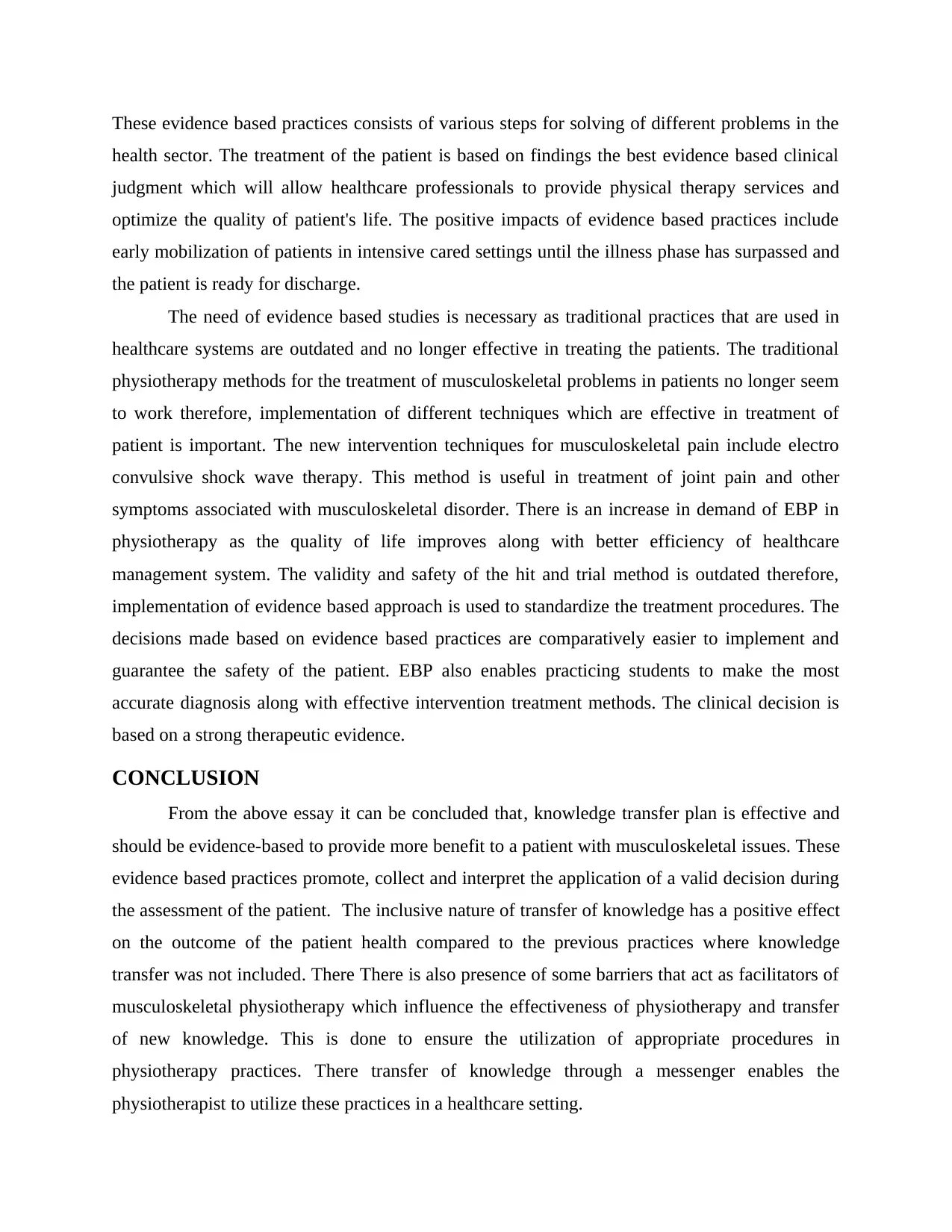
These evidence based practices consists of various steps for solving of different problems in the
health sector. The treatment of the patient is based on findings the best evidence based clinical
judgment which will allow healthcare professionals to provide physical therapy services and
optimize the quality of patient's life. The positive impacts of evidence based practices include
early mobilization of patients in intensive cared settings until the illness phase has surpassed and
the patient is ready for discharge.
The need of evidence based studies is necessary as traditional practices that are used in
healthcare systems are outdated and no longer effective in treating the patients. The traditional
physiotherapy methods for the treatment of musculoskeletal problems in patients no longer seem
to work therefore, implementation of different techniques which are effective in treatment of
patient is important. The new intervention techniques for musculoskeletal pain include electro
convulsive shock wave therapy. This method is useful in treatment of joint pain and other
symptoms associated with musculoskeletal disorder. There is an increase in demand of EBP in
physiotherapy as the quality of life improves along with better efficiency of healthcare
management system. The validity and safety of the hit and trial method is outdated therefore,
implementation of evidence based approach is used to standardize the treatment procedures. The
decisions made based on evidence based practices are comparatively easier to implement and
guarantee the safety of the patient. EBP also enables practicing students to make the most
accurate diagnosis along with effective intervention treatment methods. The clinical decision is
based on a strong therapeutic evidence.
CONCLUSION
From the above essay it can be concluded that, knowledge transfer plan is effective and
should be evidence-based to provide more benefit to a patient with musculoskeletal issues. These
evidence based practices promote, collect and interpret the application of a valid decision during
the assessment of the patient. The inclusive nature of transfer of knowledge has a positive effect
on the outcome of the patient health compared to the previous practices where knowledge
transfer was not included. There There is also presence of some barriers that act as facilitators of
musculoskeletal physiotherapy which influence the effectiveness of physiotherapy and transfer
of new knowledge. This is done to ensure the utilization of appropriate procedures in
physiotherapy practices. There transfer of knowledge through a messenger enables the
physiotherapist to utilize these practices in a healthcare setting.
health sector. The treatment of the patient is based on findings the best evidence based clinical
judgment which will allow healthcare professionals to provide physical therapy services and
optimize the quality of patient's life. The positive impacts of evidence based practices include
early mobilization of patients in intensive cared settings until the illness phase has surpassed and
the patient is ready for discharge.
The need of evidence based studies is necessary as traditional practices that are used in
healthcare systems are outdated and no longer effective in treating the patients. The traditional
physiotherapy methods for the treatment of musculoskeletal problems in patients no longer seem
to work therefore, implementation of different techniques which are effective in treatment of
patient is important. The new intervention techniques for musculoskeletal pain include electro
convulsive shock wave therapy. This method is useful in treatment of joint pain and other
symptoms associated with musculoskeletal disorder. There is an increase in demand of EBP in
physiotherapy as the quality of life improves along with better efficiency of healthcare
management system. The validity and safety of the hit and trial method is outdated therefore,
implementation of evidence based approach is used to standardize the treatment procedures. The
decisions made based on evidence based practices are comparatively easier to implement and
guarantee the safety of the patient. EBP also enables practicing students to make the most
accurate diagnosis along with effective intervention treatment methods. The clinical decision is
based on a strong therapeutic evidence.
CONCLUSION
From the above essay it can be concluded that, knowledge transfer plan is effective and
should be evidence-based to provide more benefit to a patient with musculoskeletal issues. These
evidence based practices promote, collect and interpret the application of a valid decision during
the assessment of the patient. The inclusive nature of transfer of knowledge has a positive effect
on the outcome of the patient health compared to the previous practices where knowledge
transfer was not included. There There is also presence of some barriers that act as facilitators of
musculoskeletal physiotherapy which influence the effectiveness of physiotherapy and transfer
of new knowledge. This is done to ensure the utilization of appropriate procedures in
physiotherapy practices. There transfer of knowledge through a messenger enables the
physiotherapist to utilize these practices in a healthcare setting.
Paraphrase This Document
Need a fresh take? Get an instant paraphrase of this document with our AI Paraphraser
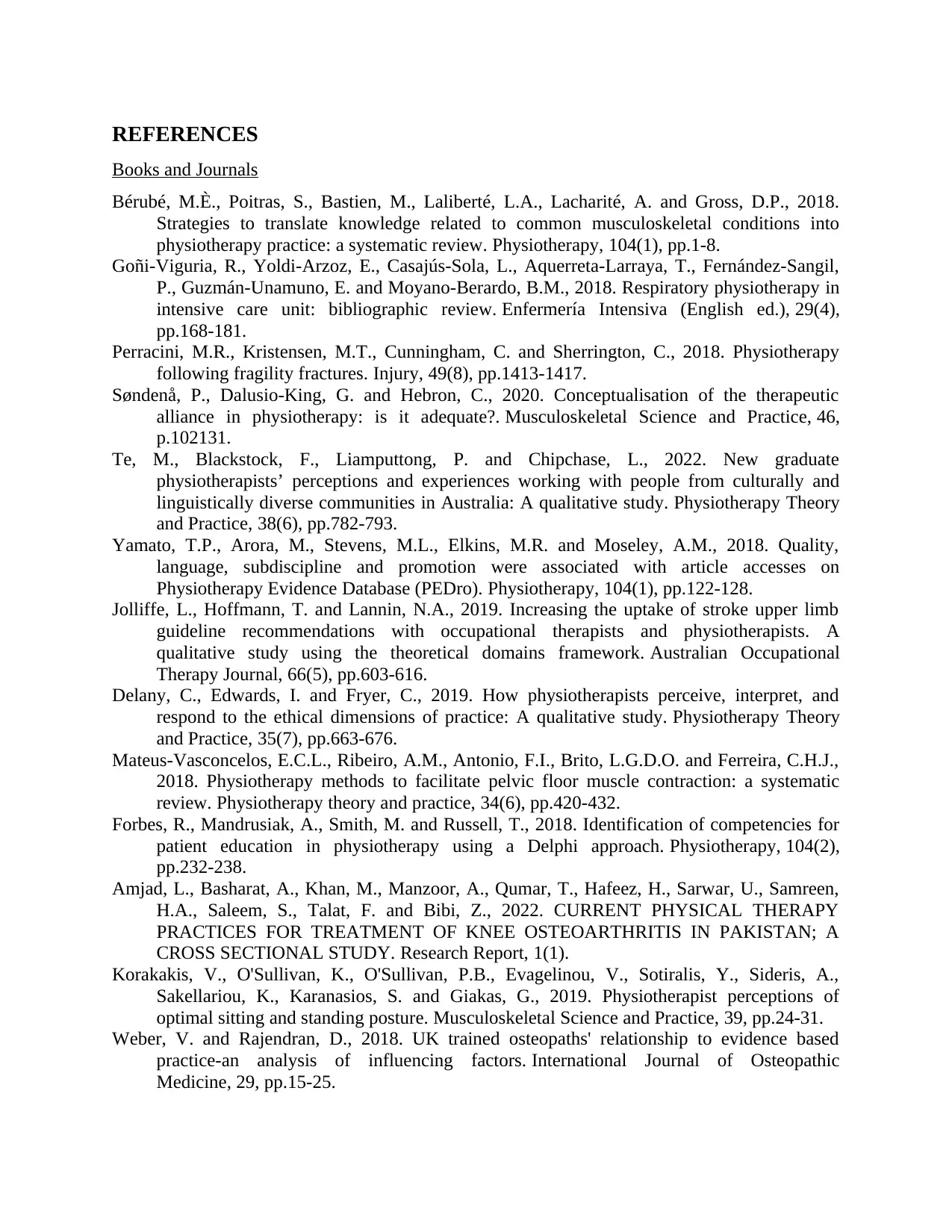
REFERENCES
Books and Journals
Bérubé, M.È., Poitras, S., Bastien, M., Laliberté, L.A., Lacharité, A. and Gross, D.P., 2018.
Strategies to translate knowledge related to common musculoskeletal conditions into
physiotherapy practice: a systematic review. Physiotherapy, 104(1), pp.1-8.
Goñi-Viguria, R., Yoldi-Arzoz, E., Casajús-Sola, L., Aquerreta-Larraya, T., Fernández-Sangil,
P., Guzmán-Unamuno, E. and Moyano-Berardo, B.M., 2018. Respiratory physiotherapy in
intensive care unit: bibliographic review. Enfermería Intensiva (English ed.), 29(4),
pp.168-181.
Perracini, M.R., Kristensen, M.T., Cunningham, C. and Sherrington, C., 2018. Physiotherapy
following fragility fractures. Injury, 49(8), pp.1413-1417.
Søndenå, P., Dalusio-King, G. and Hebron, C., 2020. Conceptualisation of the therapeutic
alliance in physiotherapy: is it adequate?. Musculoskeletal Science and Practice, 46,
p.102131.
Te, M., Blackstock, F., Liamputtong, P. and Chipchase, L., 2022. New graduate
physiotherapists’ perceptions and experiences working with people from culturally and
linguistically diverse communities in Australia: A qualitative study. Physiotherapy Theory
and Practice, 38(6), pp.782-793.
Yamato, T.P., Arora, M., Stevens, M.L., Elkins, M.R. and Moseley, A.M., 2018. Quality,
language, subdiscipline and promotion were associated with article accesses on
Physiotherapy Evidence Database (PEDro). Physiotherapy, 104(1), pp.122-128.
Jolliffe, L., Hoffmann, T. and Lannin, N.A., 2019. Increasing the uptake of stroke upper limb
guideline recommendations with occupational therapists and physiotherapists. A
qualitative study using the theoretical domains framework. Australian Occupational
Therapy Journal, 66(5), pp.603-616.
Delany, C., Edwards, I. and Fryer, C., 2019. How physiotherapists perceive, interpret, and
respond to the ethical dimensions of practice: A qualitative study. Physiotherapy Theory
and Practice, 35(7), pp.663-676.
Mateus-Vasconcelos, E.C.L., Ribeiro, A.M., Antonio, F.I., Brito, L.G.D.O. and Ferreira, C.H.J.,
2018. Physiotherapy methods to facilitate pelvic floor muscle contraction: a systematic
review. Physiotherapy theory and practice, 34(6), pp.420-432.
Forbes, R., Mandrusiak, A., Smith, M. and Russell, T., 2018. Identification of competencies for
patient education in physiotherapy using a Delphi approach. Physiotherapy, 104(2),
pp.232-238.
Amjad, L., Basharat, A., Khan, M., Manzoor, A., Qumar, T., Hafeez, H., Sarwar, U., Samreen,
H.A., Saleem, S., Talat, F. and Bibi, Z., 2022. CURRENT PHYSICAL THERAPY
PRACTICES FOR TREATMENT OF KNEE OSTEOARTHRITIS IN PAKISTAN; A
CROSS SECTIONAL STUDY. Research Report, 1(1).
Korakakis, V., O'Sullivan, K., O'Sullivan, P.B., Evagelinou, V., Sotiralis, Y., Sideris, A.,
Sakellariou, K., Karanasios, S. and Giakas, G., 2019. Physiotherapist perceptions of
optimal sitting and standing posture. Musculoskeletal Science and Practice, 39, pp.24-31.
Weber, V. and Rajendran, D., 2018. UK trained osteopaths' relationship to evidence based
practice-an analysis of influencing factors. International Journal of Osteopathic
Medicine, 29, pp.15-25.
Books and Journals
Bérubé, M.È., Poitras, S., Bastien, M., Laliberté, L.A., Lacharité, A. and Gross, D.P., 2018.
Strategies to translate knowledge related to common musculoskeletal conditions into
physiotherapy practice: a systematic review. Physiotherapy, 104(1), pp.1-8.
Goñi-Viguria, R., Yoldi-Arzoz, E., Casajús-Sola, L., Aquerreta-Larraya, T., Fernández-Sangil,
P., Guzmán-Unamuno, E. and Moyano-Berardo, B.M., 2018. Respiratory physiotherapy in
intensive care unit: bibliographic review. Enfermería Intensiva (English ed.), 29(4),
pp.168-181.
Perracini, M.R., Kristensen, M.T., Cunningham, C. and Sherrington, C., 2018. Physiotherapy
following fragility fractures. Injury, 49(8), pp.1413-1417.
Søndenå, P., Dalusio-King, G. and Hebron, C., 2020. Conceptualisation of the therapeutic
alliance in physiotherapy: is it adequate?. Musculoskeletal Science and Practice, 46,
p.102131.
Te, M., Blackstock, F., Liamputtong, P. and Chipchase, L., 2022. New graduate
physiotherapists’ perceptions and experiences working with people from culturally and
linguistically diverse communities in Australia: A qualitative study. Physiotherapy Theory
and Practice, 38(6), pp.782-793.
Yamato, T.P., Arora, M., Stevens, M.L., Elkins, M.R. and Moseley, A.M., 2018. Quality,
language, subdiscipline and promotion were associated with article accesses on
Physiotherapy Evidence Database (PEDro). Physiotherapy, 104(1), pp.122-128.
Jolliffe, L., Hoffmann, T. and Lannin, N.A., 2019. Increasing the uptake of stroke upper limb
guideline recommendations with occupational therapists and physiotherapists. A
qualitative study using the theoretical domains framework. Australian Occupational
Therapy Journal, 66(5), pp.603-616.
Delany, C., Edwards, I. and Fryer, C., 2019. How physiotherapists perceive, interpret, and
respond to the ethical dimensions of practice: A qualitative study. Physiotherapy Theory
and Practice, 35(7), pp.663-676.
Mateus-Vasconcelos, E.C.L., Ribeiro, A.M., Antonio, F.I., Brito, L.G.D.O. and Ferreira, C.H.J.,
2018. Physiotherapy methods to facilitate pelvic floor muscle contraction: a systematic
review. Physiotherapy theory and practice, 34(6), pp.420-432.
Forbes, R., Mandrusiak, A., Smith, M. and Russell, T., 2018. Identification of competencies for
patient education in physiotherapy using a Delphi approach. Physiotherapy, 104(2),
pp.232-238.
Amjad, L., Basharat, A., Khan, M., Manzoor, A., Qumar, T., Hafeez, H., Sarwar, U., Samreen,
H.A., Saleem, S., Talat, F. and Bibi, Z., 2022. CURRENT PHYSICAL THERAPY
PRACTICES FOR TREATMENT OF KNEE OSTEOARTHRITIS IN PAKISTAN; A
CROSS SECTIONAL STUDY. Research Report, 1(1).
Korakakis, V., O'Sullivan, K., O'Sullivan, P.B., Evagelinou, V., Sotiralis, Y., Sideris, A.,
Sakellariou, K., Karanasios, S. and Giakas, G., 2019. Physiotherapist perceptions of
optimal sitting and standing posture. Musculoskeletal Science and Practice, 39, pp.24-31.
Weber, V. and Rajendran, D., 2018. UK trained osteopaths' relationship to evidence based
practice-an analysis of influencing factors. International Journal of Osteopathic
Medicine, 29, pp.15-25.
1 out of 8
Related Documents
Your All-in-One AI-Powered Toolkit for Academic Success.
+13062052269
info@desklib.com
Available 24*7 on WhatsApp / Email
![[object Object]](/_next/static/media/star-bottom.7253800d.svg)
Unlock your academic potential
Copyright © 2020–2026 A2Z Services. All Rights Reserved. Developed and managed by ZUCOL.




